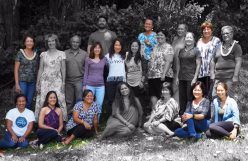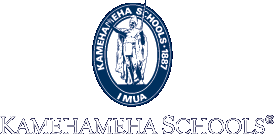Our Science Vision
Students who exit KES Kapālama Science will have a deep appreciation of science as a human endeavor to understand more about their world. They will recognize their kuleana to utilize a variety of sources to build knowledge through inquiry.
Ma ka hana ka ‘ike. They will learn science by doing science. Haumāna will create a dynamic concept of interdependence. They will communicate their learning and develop their own conclusions based upon their experiences.
Students will begin the journey of formulating their kuana ‘ike, their own perspective and world view regarding their island environment—ka ‘āina and ke kai—and their relationship with our planet.
In our grade 3 unit on water, students learn more about how important this unique earth material is to scientists and to all of us on our island habitat. One of the key goals of Grade 3 science is to help students hone their observational skills by gathering data and explaining their discoveries in an organized manner. Through active investigations in our water unit, students will be able to explain the properties of water, including water in nature, its amazing changes with heating and cooling, and the transformative processes of evaporation and condensation. ʻŌlelo noʻeau and moʻolelo help students to reflect on the big idea of our unit: Responsible stewardship of water is essential to the survival of all living things.
In our second unit of study, students work through the Engineering Design Process to rethink and support multiple solutions. They use critical thinking, communication, and collaboration skills to design a solution for cleaning fish tanks as well as to design a system to protect farm crops.
Our curriculum for grade 3 is aligned with national standards and benchmarks, E Ola!, and our K-12 Transfer Goals. It is balanced across the fields of physical science, life science and earth science while helping students to develop and practice the “habits of mind” scientists use in the inquiry process to find out more about their world. Each student in science creates a science notebook as a record of his or her unique observations in visual and written language. School iPads are used as a learning tool to explain student observations of phenomena.
Students attend science lab twice during the 6-day cycle for either the fall or spring semester for 80 minutes.
If you have any questions or concerns, please contact me at deuwaine@ksbe.edu.
Mahalo,
Debbie Uwaine
Debbie Uwaine, Science, grade 3-4 Specialist

Phone (808) 842-8457 Email: deuwaine@ksbe.edu

